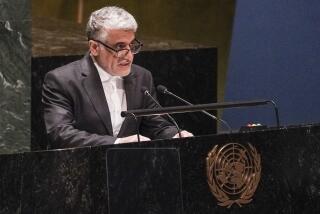Libya Behind Berlin Blast, U.S. Charges
- Share via
WASHINGTON — The Reagan Administration on Monday accused Libya of responsibility for the West Berlin discotheque bombing that killed an off-duty U.S. soldier, and American officials pointedly refused to rule out a military reprisal.
The most outspoken denunciation of Col. Moammar Kadafi’s regime came from Richard R. Burt, U.S. ambassador to West Germany. Burt, in a television interview, said U.S. intelligence agencies have “very clear indications that there was Libyan involvement” in the bombing, which also killed a Turkish woman and injured nearly 200 people.
‘Despicable Attack’
At the State Department, spokesman Bernard Kalb said: “The despicable attack in Berlin fits the pattern of increased Libyan activities. . . . The West German and Berlin government officials are working with us in examining all available evidence in order to reach a definitive judgment.”
Neither Burt nor Kalb disclosed any specific evidence to tie the Libyans to the attack on the nightclub, which was popular with U.S. service personnel.
(ABC News reported late Monday that a communique was intercepted between Tripoli, the Libyan capital, and the Libyan Embassy in East Berlin expressing “praise for a job well done” after the weekend disco bombing.)
In response to the attack, the Administration renewed its effort to isolate Libya diplomatically and economically. Kalb said the Administration was urging friendly nations to consider expelling Libyan diplomats “involved in actual or potential terrorist activities.”
Kalb refused to speculate on the possibility of military action, but Burt said on NBC-TV’s “Today” show that Reagan is “studying” his options, including the use of force.
Asked if there would be a military reprisal, Burt said: “I’m not going to close the President’s options. That’s up to him. He’s studying this issue right now.”
The Administration has said repeatedly that it would retaliate for terrorist attacks against Americans, possibly by the use of military force, if it could establish responsibility and pinpoint a target linked directly to the terrorists.
An Obvious Target
Firm evidence of Libyan involvement in the West Berlin bombing would give Washington an obvious target for retaliation. Military action could include a naval blockade of the Libyan coast, air strikes against oil export facilities or bombing attacks on other military or economic targets.
U.S. strategists do not consider Libya’s armed forces to be much of an impediment to military action. But analysts believe that, by using force, the United States would run the risk of drawing the Soviet Union, which supports Libya, into the confrontation. Any military action would include some danger of Soviet involvement, and the risk would increase with the intensity of the attack.
Nevertheless, the Administration has virtually exhausted the list of sanctions that it can apply to Libya without resorting to military force. After the terrorist attacks on the Rome and Vienna airports last December, which the United States accused Kadafi of sponsoring, Washington cut off virtually all economic contact with Tripoli and urged U.S. allies to follow suit. Officials said at the time that there was not much more that could be done peacefully.
Calling for Expulsions
Kalb did suggest one other diplomatic step in calling for all friendly governments to expel Libyan diplomats.
“Where there are indications or reasons to believe the local Libyan People’s Bureaus (embassies) . . . are involved in actual or potential terrorist activities, it is certainly to the advantage of the host country, as well as others, to take action to deal with those who pose such terrorist threats,” Kalb said.
From Washington’s standpoint, virtually every Libyan diplomat is at least a potential terrorist. Kalb, attempting to tie Libya to the West Berlin bombing, relied on evidence of previous Libyan actions.
Threats Taken Seriously
“There have been numerous indications that over a period of time Libyan agents were targeting Americans and U.S. facilities, including surveillance as possible preparation for potential attacks,” Kalb said. “The State Department spokesman made this public on March 26. Libya has been calling for suicide attacks on the U.S. for several weeks. We take these threats seriously.”
Asked if there was any evidence to tie Libya to the discotheque bombing, Kalb replied that there was, but he declined to provide any details.
“I don’t want to leave the impression that with the blast that took place at the discotheque, the accumulation of evidence has come to an end,” Kalb said. “I will not amplify on the original overall statement; I will just say that the investigation and the accumulation of indications . . . has followed the blast.”
More to Read
Sign up for Essential California
The most important California stories and recommendations in your inbox every morning.
You may occasionally receive promotional content from the Los Angeles Times.










